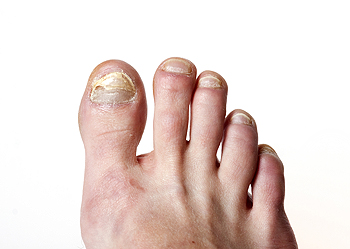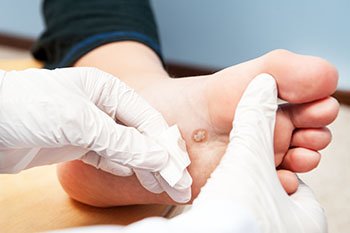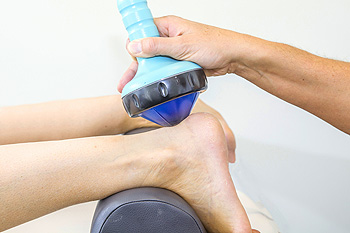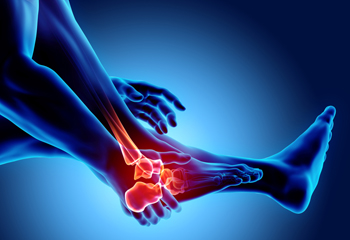Items filtered by date: March 2021
When Is Shockwave Therapy Used to Treat Plantar Fasciitis?
The plantar fascia is the thick layer of tissue connecting your heel bone to the toes. This area can become inflamed or tear, causing plantar fasciitis. This painful disorder is sometimes experienced as hot, intense pain in your heel, and it may also cause swelling. Pain can be acute in the morning and sometimes may lessen during an activity once you are warmed up. If you are experiencing inflammation only, your podiatrist may try to treat the area with a variety of therapies including orthotics, taping and strapping, steroid injections and other techniques. If your plantar fascia has torn, this is more serious, and your podiatrist may suggest shockwave therapy—which can be successful in repairing damaged connective tissue and relieving pain without resorting to surgery.
Shockwave therapy is a treatment commonly used to treat various injuries and conditions, particularly plantar fasciitis in the feet. To learn more, consult with Dr. Tupper from Coshocton Foot Health Center. Our doctor can provide the care you need to keep you pain-free and on your feet.
Shockwave Therapy
Shockwave therapy is a new treatment option designed to treat bone conditions such as tennis elbow, shoulder pain, and others. Shockwave therapy uses high intensity sound waves that are directed to the affected tissues of the body with pinpoint accuracy. The effects are very beneficial, leading to a production of collagen fibers, eliminating inflammation.
Who Benefits from Shockwave?
Shockwave is recommended for patients suffering from heel pain and associated problems. Heel pain is a common condition which can be caused by obesity, overexertion, and spending a substantial amount of time on hard floors with your feet exposed and unsupported.
Fast and Easy
The therapy is actually a simple process that can leave patients feeling better the very next day. Shockwave therapy is not as dramatic as it sounds. It enables more blood flow to effected areas, addressing the source of the problem and allowing treatment to last for a long time.
Treatment & Recovery Time
Shockwave treatment will enable your feet to recover quickly. This is especially important since surgery is not required. It is cost effective and does not require the use of anesthesia. This treatment is a better option to surgery, since it is proven safe.
If you have any questions, please feel free to contact our office located in Coshocton, OH . We offer the newest diagnostic and treatment technologies for all your foot and ankle needs.
Is Toenail Fungus Contagious?
 Fungal infections of the toenails are a common problem, affecting at least 10% of the adult population. One of the reasons that this type of infection may be so common is because it is contagious. Within an individual, fungal infections can spread from one infected nail to another nail, and from infected nails to the surrounding skin. Having poor foot hygiene, wearing old shoes made with unbreathable materials, sharing personal items like pedicure tools or towels, and walking barefoot in public places can put you at a greater risk of contracting toenail fungus. If you notice the symptoms of a fungal infection in your toenails, such as the nails thickening, changing shape or texture, or becoming discolored, please see a podiatrist for treatment.
Fungal infections of the toenails are a common problem, affecting at least 10% of the adult population. One of the reasons that this type of infection may be so common is because it is contagious. Within an individual, fungal infections can spread from one infected nail to another nail, and from infected nails to the surrounding skin. Having poor foot hygiene, wearing old shoes made with unbreathable materials, sharing personal items like pedicure tools or towels, and walking barefoot in public places can put you at a greater risk of contracting toenail fungus. If you notice the symptoms of a fungal infection in your toenails, such as the nails thickening, changing shape or texture, or becoming discolored, please see a podiatrist for treatment.
For more information about treatment, contact Dr. Tupper of Coshocton Foot Health Center. Our doctor can provide the care you need to keep you pain-free and on your feet.
Toenail Fungus Treatment
Toenail fungus is a condition that affects many people and can be especially hard to get rid of. Fortunately, there are several methods to go about treating and avoiding it.
Antifungals & Deterrence
Oral antifungal medicine has been shown to be effective in many cases. It is important to consult with a podiatrist to determine the proper regiment for you, or potentially explore other options.
Applying foot powder on the feet and shoes helps keep the feet free of moisture and sweat.
Sandals or open toed shoes – Wearing these will allow air movement and help keep feet dry. They also expose your feet to light, which fungus cannot tolerate. Socks with moisture wicking material also help as well.
If you have any questions please feel free to contact our office located in Coshocton, OH . We offer the newest diagnostic tools and technology to treat your foot and ankle needs.
Causes and a Possible Solution for Ingrown Toenails
 An ingrown toenail can be quite painful and uncomfortable. It is a foot condition defined as a toenail that grows into the sides of the nail bed. This can occur for a variety of reasons including genetics, trimming the toenails incorrectly, or from an injury to the affected toe. Additionally, this condition may also arise due to wearing shoes that do not have adequate room for the toes to move freely in. A common symptom is extreme tenderness surrounding the affected nail, and pus may drain from the area if it becomes infected. Many patients have found mild relief when the foot is frequently soaked in warm water, and this can be helpful in softening the skin to gently lift the corners of the nail. If you have developed an ingrown toenail it is suggested that you seek professional advice from a podiatrist who can effectively treat this condition.
An ingrown toenail can be quite painful and uncomfortable. It is a foot condition defined as a toenail that grows into the sides of the nail bed. This can occur for a variety of reasons including genetics, trimming the toenails incorrectly, or from an injury to the affected toe. Additionally, this condition may also arise due to wearing shoes that do not have adequate room for the toes to move freely in. A common symptom is extreme tenderness surrounding the affected nail, and pus may drain from the area if it becomes infected. Many patients have found mild relief when the foot is frequently soaked in warm water, and this can be helpful in softening the skin to gently lift the corners of the nail. If you have developed an ingrown toenail it is suggested that you seek professional advice from a podiatrist who can effectively treat this condition.
Ingrown toenails can become painful if they are not treated properly. For more information about ingrown toenails, contact Dr. Tupper of Coshocton Foot Health Center. Our doctor can provide the care you need to keep you pain-free and on your feet.
Ingrown Toenails
Ingrown toenails occur when a toenail grows sideways into the bed of the nail, causing pain, swelling, and possibly infection.
Causes
- Bacterial infections
- Improper nail cutting such as cutting it too short or not straight across
- Trauma to the toe, such as stubbing, which causes the nail to grow back irregularly
- Ill-fitting shoes that bunch the toes too close together
- Genetic predisposition
Prevention
Because ingrown toenails are not something found outside of shoe-wearing cultures, going barefoot as often as possible will decrease the likeliness of developing ingrown toenails. Wearing proper fitting shoes and using proper cutting techniques will also help decrease your risk of developing ingrown toenails.
Treatment
Ingrown toenails are a very treatable foot condition. In minor cases, soaking the affected area in salt or antibacterial soaps will not only help with the ingrown nail itself, but also help prevent any infections from occurring. In more severe cases, surgery is an option. In either case, speaking to your podiatrist about this condition will help you get a better understanding of specific treatment options that are right for you.
If you have any questions please feel free to contact our office located in Coshocton, OH . We offer the newest diagnostic and treatment technologies for all your foot and ankle needs.
What Is Juvenile Idiopathic Arthritis?
Juvenile idiopathic arthritis (JIA) is the most common type of arthritis in children and adolescents. This condition can cause inflammation and joint pain in any joint in the body, including those in the feet and ankles. These symptoms can make it difficult to walk, as joints become stiff, swollen, and tender. The child may become easily tired, and it can become harder to complete activities of daily living. JIA is an autoimmune disease and its causes are currently unknown. If your child has JIA that affects their feet or ankles, a podiatrist can help manage the foot and ankle symptoms associated with this disease.
Arthritis can be a difficult condition to live with. If you are seeking treatment, contact Dr. Tupper from Coshocton Foot Health Center. Our doctor can provide the care you need to keep you pain-free and on your feet.
Arthritic Foot Care
Arthritis is a joint disorder that involves the inflammation of different joints in your body, such as those in your feet. Arthritis is often caused by a degenerative joint disease and causes mild to severe pain in all affected areas. In addition to this, swelling and stiffness in the affected joints can also be a common symptom of arthritis.
In many cases, wearing ill-fitting shoes can worsen the effects and pain of arthritis. Wearing shoes that have a lower heel and extra room can help your feet feel more comfortable. In cases of rheumatoid arthritis, the arch in your foot may become problematic. Buying shoes with proper arch support that contour to your feet can help immensely.
Alleviating Arthritic Pain
- Exercises that stretch the foot can prevent further pain and injury and increase mobility
- Most of the pain can be alleviated with anti-inflammatory drugs, heat, and topical medications
- Massages can help temporarily alleviate pain.
It is best to see your doctor for the treatment that is right for your needs and symptoms. Conditions vary, and a podiatrist can help you determine the right method of care for your feet.
If you have any questions, please feel free to contact our office located in Coshocton, OH . We offer the newest diagnostic tools and technology to treat your foot and ankle needs.
Do I Have a Plantar Wart?
 Plantar warts are a small growth on the sole of the foot. They grow because of the human papillomavirus (HPV) that infects the foot through small cracks in the skin. These growths usually form in weight bearing areas, and they usually appear flat. Plantar warts can often look grainy and somewhat rough, and can also be indicated by black dots that are often small clots, pain or tenderness while standing or walking, and thickened hard skin over the wart. If you have a plantar wart, please consult with a podiatrist. A podiatrist will be able to suggest treatments such as cryotherapy, laser treatment, prescriptions or surgery
Plantar warts are a small growth on the sole of the foot. They grow because of the human papillomavirus (HPV) that infects the foot through small cracks in the skin. These growths usually form in weight bearing areas, and they usually appear flat. Plantar warts can often look grainy and somewhat rough, and can also be indicated by black dots that are often small clots, pain or tenderness while standing or walking, and thickened hard skin over the wart. If you have a plantar wart, please consult with a podiatrist. A podiatrist will be able to suggest treatments such as cryotherapy, laser treatment, prescriptions or surgery
Plantar warts can be very uncomfortable. If you need your feet checked, contact Dr. Tupper from Coshocton Foot Health Center. Our doctor will assist you with all of your foot and ankle needs.
About Plantar Warts
Plantar warts are the result of HPV, or human papillomavirus, getting into open wounds on the feet. They are mostly found on the heels or balls of the feet.
While plantar warts are generally harmless, those experiencing excessive pain or those suffering from diabetes or a compromised immune system require immediate medical care. Plantar warts are easily diagnosed, usually through scraping off a bit of rough skin or by getting a biopsy.
Symptoms
- Lesions on the bottom of your feet, usually rough and grainy
- Hard or thick callused spots
- Wart seeds, which are small clotted blood vessels that look like little black spots
- Pain, discomfort, or tenderness of your feet when walking or standing
Treatment
- Freezing
- Electric tool removal
- Laser Treatment
- Topical Creams (prescription only)
- Over-the-counter medications
To help prevent developing plantar warts, avoid walking barefoot over abrasive surfaces that can cause cuts or wounds for HPV to get into. Avoiding direct contact with other warts, as well as not picking or rubbing existing warts, can help prevent the further spread of plantar warts. However, if you think you have developed plantar warts, speak to your podiatrist. He or she can diagnose the warts on your feet and recommend the appropriate treatment options.
If you have any questions please feel free to contact our office located in Coshocton, OH . We offer the newest diagnostic and treatment technologies for all your foot and ankle needs.




